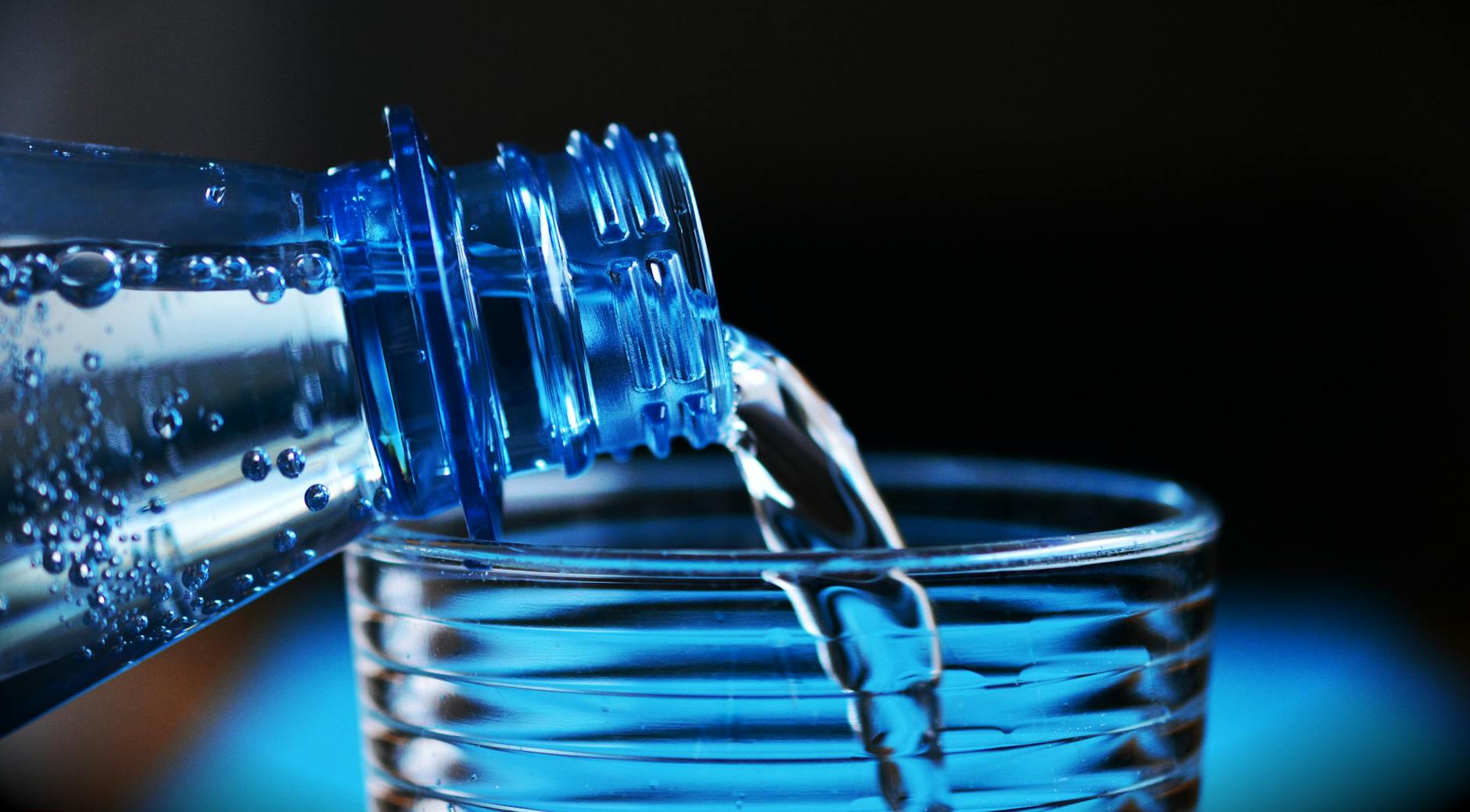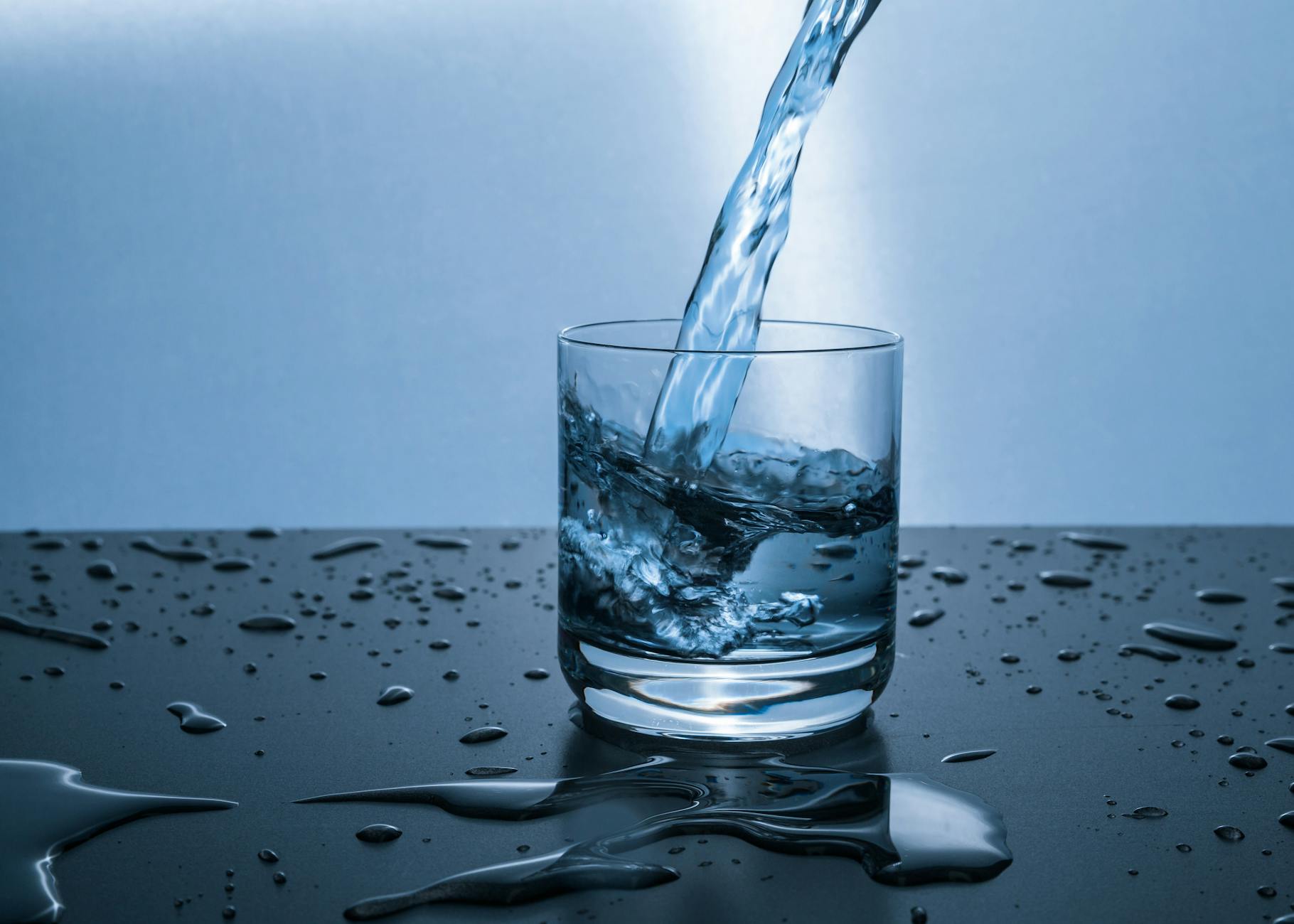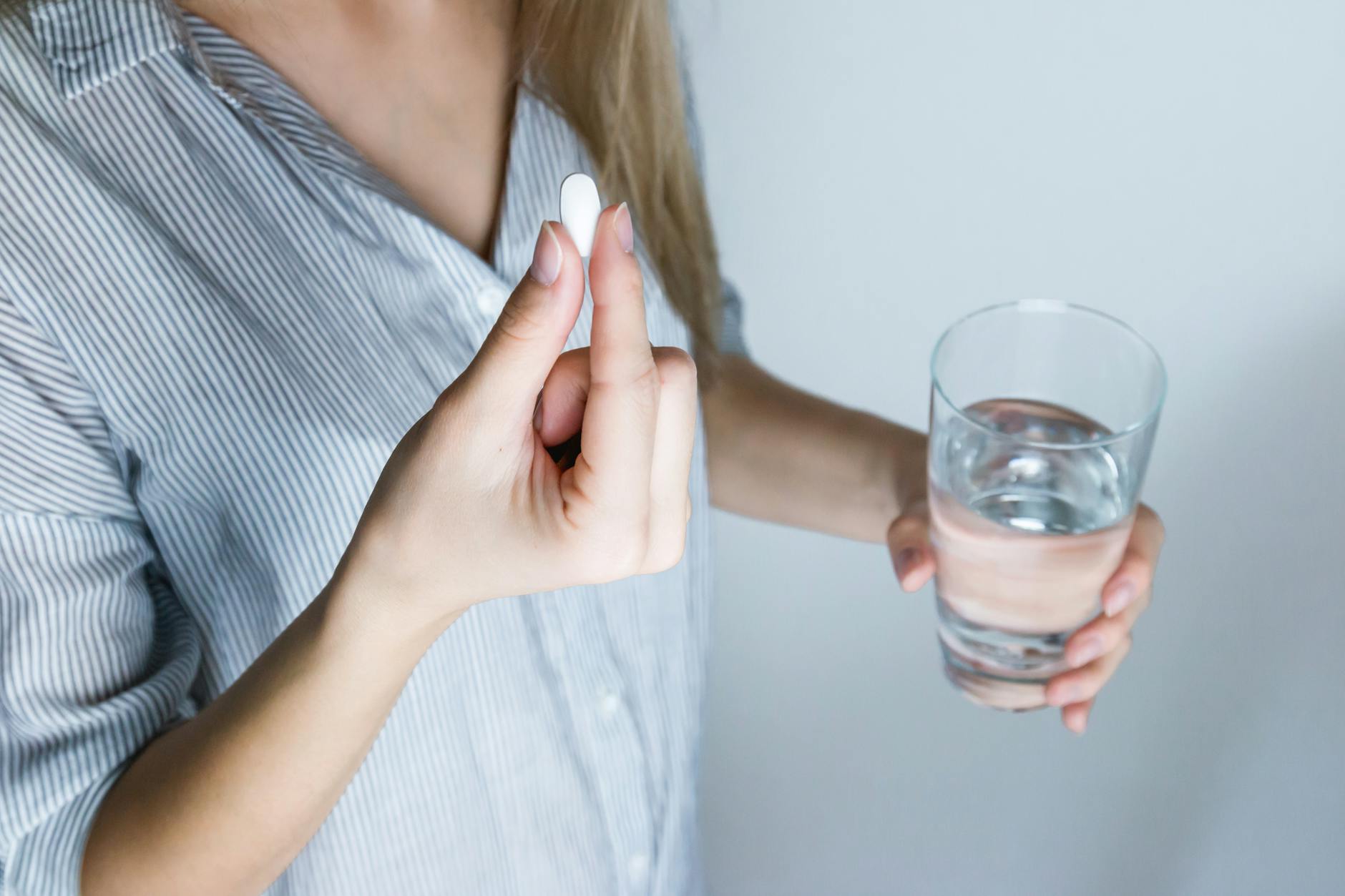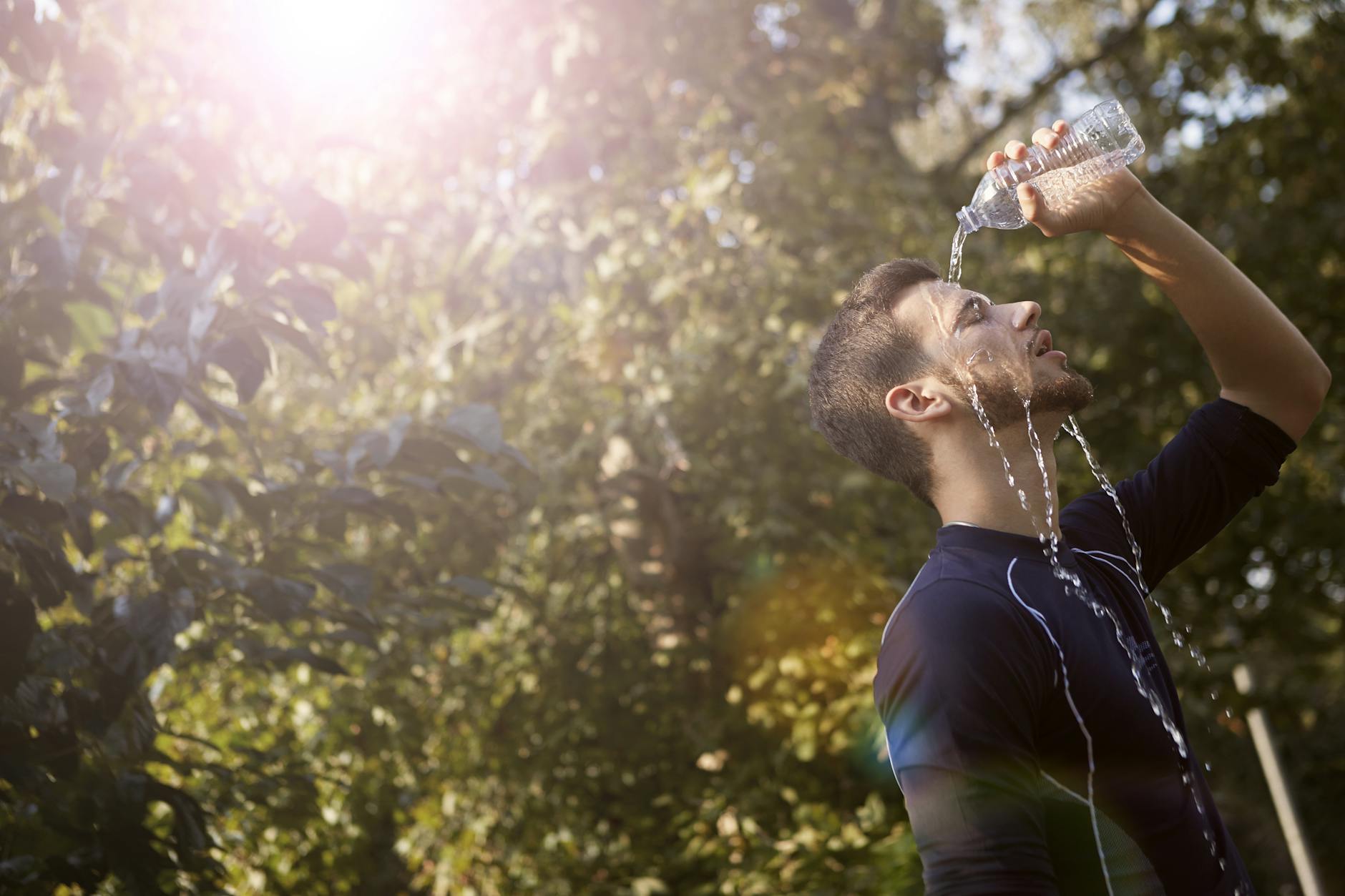
Your body depends on water for nearly every function, from regulating temperature to transporting nutrients. How to stay hydrated isn't just about drinking when you're thirsty—it's about understanding why water is vital for your health and making smart choices daily.
This guide is for anyone who wants to feel their best, whether you're an athlete, busy professional, or someone simply looking to improve your wellness routine. You'll discover the science behind your body's water needs and learn to spot early dehydration warning signs before they impact your health. We'll also share practical strategies to boost your daily water intake and explore hydration alternatives beyond plain water that can keep you properly hydrated in any situation.
Understanding Your Body's Water Requirements

Daily water intake recommendations for different age groups
Your water needs change as you go through life, and what works for your teenager won't be the same as what your grandmother needs. The general "8 glasses a day" rule is a good starting point, but it's not one-size-fits-all.
For children ages 4-8, about 5 cups of water daily keeps them properly hydrated. Kids 9-13 need around 7-8 cups, while teenagers should aim for 8-11 cups depending on their activity level. Adults typically need 11-15 cups of total fluids per day, with women generally requiring about 11 cups and men needing closer to 15 cups.
Older adults face unique challenges since their thirst sensation weakens with age. They should aim for the same amounts as younger adults but need to be more intentional about drinking water regularly throughout the day.
Factors that increase your hydration needs
Several situations bump up your water requirements beyond the baseline recommendations. Physical activity tops the list – you'll need an extra 12-16 ounces for every hour of exercise, more if you're sweating heavily or working out in hot conditions.
Hot weather and high altitudes also increase your needs. When temperatures soar above 85°F, your body works overtime to cool itself through sweating. Similarly, altitudes above 8,000 feet trigger faster breathing and increased urination, both of which drain your water reserves.
Illness ramps up your requirements too. Fever, vomiting, and diarrhea can quickly dehydrate you. Even common conditions like the flu or a cold increase your fluid needs. Pregnancy and breastfeeding also significantly increase water requirements – pregnant women need about 10 cups daily, while breastfeeding mothers should aim for 13 cups.
How to calculate your personal water requirements
Start with your body weight as the foundation. A simple formula suggests drinking half to one ounce of water per pound of body weight daily. So if you weigh 150 pounds, you'd need 75-150 ounces of water, which translates to about 9-19 cups.
Your activity level refines this calculation. Add 12 ounces for every 30 minutes of moderate exercise, and increase this for intense workouts or hot conditions. Climate matters too – add 16-24 ounces on hot days or when you're in heated indoor environments.
Pay attention to your individual response. Some people naturally need more water due to their metabolism, kidney function, or medication side effects. Track your intake and how you feel for a week to find your sweet spot.
Signs your body is asking for more water
Your body sends clear signals when it needs more water, but many people miss these early warnings. Thirst is actually a late-stage indicator – by the time you feel thirsty, you're already mildly dehydrated.
Check your urine color as your most reliable hydration gauge. Pale yellow indicates good hydration, while dark yellow or amber suggests you need more fluids. The frequency matters too – you should urinate every 3-4 hours during the day.
Physical signs include dry mouth, fatigue, headaches, and dizziness. Your skin loses elasticity when dehydrated – pinch the skin on the back of your hand, and it should snap back immediately. Slow return indicates dehydration.
Mental fog, irritability, and difficulty concentrating also signal inadequate hydration. Your brain is about 75% water, so even mild dehydration affects cognitive function. Muscle cramps, especially during or after exercise, often indicate both dehydration and electrolyte imbalance.
The Science Behind Water's Role in Your Body
Water's Function in Cellular Processes and Metabolism
Water serves as the foundation for every chemical reaction happening inside your cells right now. Think of it as the highway system that delivers nutrients, oxygen, and hormones to where they need to go while hauling away waste products like cellular garbage trucks. Without adequate water, this intricate transportation network slows down dramatically.
Your cells rely on water to maintain their shape and structure. When properly hydrated, cell membranes stay flexible and permeable, allowing essential molecules to pass through efficiently. Dehydration makes these membranes rigid, creating bottlenecks that disrupt normal cellular function.
Water also acts as a solvent, dissolving vitamins, minerals, and other nutrients so your body can actually use them. Many metabolic enzymes - the tiny workers that break down food into energy - only function properly in water-rich environments. When water levels drop, enzyme activity decreases, leaving you feeling sluggish and tired.
Temperature regulation depends heavily on water too. Your body uses sweating and breathing to release excess heat, both processes that require adequate hydration. Without enough water, your internal thermostat struggles to keep you cool during exercise or hot weather.
How Hydration Supports Your Cardiovascular System
Your heart works harder when you're dehydrated, and here's why: blood is roughly 55% water. When fluid levels drop, blood becomes thicker and more concentrated, forcing your heart to pump with extra effort to circulate this viscous mixture throughout your body.
Proper hydration keeps blood volume stable, which helps maintain healthy blood pressure. Think of your circulatory system like a garden hose - when there's adequate water flow, everything runs smoothly. Reduce that flow, and pressure changes can stress the entire system.
Well-hydrated blood carries oxygen and nutrients more efficiently to your organs and muscles. This improved circulation means your heart doesn't have to work overtime to deliver what your body needs. Athletes know this well - even mild dehydration can reduce performance and increase perceived exertion during exercise.
Blood vessels also depend on proper hydration to maintain their elasticity and function. Dehydration can lead to temporary increases in heart rate as your cardiovascular system attempts to compensate for reduced blood volume.
Water's Impact on Brain Function and Mental Clarity
Your brain tissue is approximately 75% water, making it one of the most hydration-dependent organs in your body. Even mild dehydration - as little as 2% fluid loss - can trigger noticeable changes in cognitive performance, mood, and concentration.
Water helps maintain the delicate balance of electrolytes that brain cells need to communicate with each other. These electrical signals control everything from memory formation to decision-making. When hydration drops, signal transmission becomes less efficient, leading to that foggy, unfocused feeling many people experience during busy days.
Blood flow to the brain decreases with dehydration, reducing the delivery of oxygen and glucose that fuel mental processes. This explains why dehydrated individuals often experience headaches, difficulty concentrating, and increased mental fatigue.
Research shows that proper hydration improves reaction times, working memory, and attention span. Students who drink water during exams often perform better than those who don't. The brain's ability to process information, make connections, and retrieve memories all depend on maintaining adequate fluid levels.
Mood regulation also connects to hydration status. Dehydration can increase cortisol production and trigger irritability, anxiety, and confusion. Staying properly hydrated helps maintain emotional balance and supports better stress management throughout the day.
Recognizing Dehydration Before It Becomes Dangerous
Early Warning Signs of Mild Dehydration
Your body sends subtle signals when it needs more water, often hours before you feel truly thirsty. The most obvious early indicator is thirst itself, but by the time you feel thirsty, you're already mildly dehydrated. Dark yellow urine serves as one of the most reliable early warning signs - healthy hydration typically produces pale yellow or nearly clear urine.
Headaches frequently accompany mild dehydration as blood volume decreases and your brain receives less oxygen. You might also notice your mouth feeling sticky or dry, along with decreased saliva production. Skin elasticity provides another quick test: pinch the skin on the back of your hand and release it. Well-hydrated skin snaps back immediately, while dehydrated skin takes longer to return to normal.
Other early signs include slight dizziness when standing up, mild fatigue, and difficulty concentrating. Your eyes might appear slightly sunken, and you may experience constipation as your body conserves water by drawing it from your intestines.
Physical Symptoms That Indicate Severe Dehydration
Severe dehydration presents unmistakable physical symptoms that require immediate attention. Rapid heartbeat occurs as your heart works harder to pump thickened blood through your system. Blood pressure drops significantly, often causing fainting or severe dizziness.
Your skin becomes noticeably dry and loses its elasticity completely. The pinch test will show skin that remains "tented" for several seconds. Mucous membranes in your mouth, nose, and eyes become extremely dry. You'll stop producing tears and saliva almost entirely.
Muscle cramps become severe and frequent as electrolyte imbalances worsen. Your body temperature regulation fails, leading to either fever or dangerously low body temperature. Urine production decreases dramatically, and what little urine you produce becomes dark amber or brown.
Mental confusion, irritability, and delirium often accompany severe dehydration. Your breathing may become rapid and shallow. In extreme cases, you might experience seizures due to electrolyte imbalances. These symptoms indicate a medical emergency requiring immediate professional treatment.
How Dehydration Affects Your Energy and Performance
Even mild dehydration significantly impacts your daily performance and energy levels. Research shows that losing just 2% of your body weight through fluid loss can decrease physical performance by up to 25%. Your muscles become less efficient as blood flow decreases, making every movement feel more challenging.
Mental performance suffers equally. Your brain, which is roughly 75% water, struggles to function optimally when dehydrated. Concentration becomes difficult, memory recall slows down, and decision-making abilities decline. You might find yourself feeling foggy or unable to focus on simple tasks.
Athletic performance takes a major hit with dehydration. Your body's cooling system fails as sweat production decreases, leading to overheating during exercise. Endurance drops dramatically as your cardiovascular system works overtime to maintain blood pressure. Strength and power output decline as muscles can't contract efficiently without adequate fluid.
Workplace productivity plummets when you're dehydrated. Simple tasks take longer to complete, creativity suffers, and you're more prone to making mistakes. Your reaction time slows, which can be dangerous when driving or operating equipment.
Long-term Health Consequences of Chronic Dehydration
Chronic dehydration creates serious health problems that develop gradually over months or years. Your kidneys bear the brunt of long-term dehydration, working overtime to concentrate urine and preserve fluid. This constant stress can lead to kidney stones, urinary tract infections, and potentially permanent kidney damage.
Cardiovascular health deteriorates as your heart continuously pumps thicker blood through constricted vessels. This increases your risk of high blood pressure, heart disease, and stroke. Blood clots form more easily in dehydrated individuals, creating additional cardiovascular risks.
Your digestive system suffers significantly from chronic dehydration. Constipation becomes a regular problem as your intestines absorb every drop of available water. Stomach acid becomes more concentrated, increasing your risk of ulcers and acid reflux. Nutrient absorption decreases as digestive processes become less efficient.
Joint health declines as cartilage loses its shock-absorbing properties without adequate lubrication. This leads to increased wear and tear, contributing to arthritis and joint pain. Your spine's discs, which are largely water, begin to compress and degenerate more rapidly.
Skin ages prematurely when chronically dehydrated, losing elasticity and developing wrinkles earlier. Your immune system weakens as lymphatic fluid becomes sluggish, making you more susceptible to infections and slower to heal from injuries.
Smart Strategies to Increase Your Daily Water Intake

Simple habits to drink more water throughout the day
Start your morning with a full glass of water before reaching for coffee or tea. Keep this glass on your nightstand so it's the first thing you see when you wake up. This simple ritual kickstarts your hydration for the day and helps replace fluids lost during sleep.
Anchor your water intake to existing habits. Drink a glass every time you check your email, before each meal, or after using the bathroom. This creates automatic triggers that don't require extra mental effort. Many people find success with the "water buddy" system - pairing every other beverage with an equal amount of water.
Keep water visible and within arm's reach. Place bottles in your car, at your desk, by your favorite chair, and in your bag. When water is convenient, you'll naturally drink more. Choose a water bottle you actually like using - whether it's insulated, has measurement markings, or comes in your favorite color.
Create water checkpoints throughout your day. Aim to finish a certain amount by 10 AM, noon, 3 PM, and dinner. This prevents the end-of-day scramble to catch up on hydration, which often leads to disrupted sleep from frequent bathroom trips.
Using technology and reminders to stay on track
Water tracking apps transform hydration into a game-like experience. Apps like WaterMinder, Hydro Coach, or Plant Nanny send customizable reminders and track your daily progress. Some people respond better to gentle notifications every hour, while others prefer fewer but more insistent reminders.
Set recurring phone alarms with motivational messages like "Time to hydrate!" or "Your body is asking for water." Smart watches excel at hydration reminders since they're always on your wrist. Many fitness trackers now include water intake logging features alongside step counting.
Use the "phone flip" method - every time you pick up your phone, take three sips of water before unlocking it. Given how often most people check their phones, this adds up quickly throughout the day.
Voice assistants can help too. Ask Alexa or Google to remind you to drink water at specific intervals, or use them to log your intake hands-free while cooking or working.
Making water more appealing with natural flavoring options
Transform plain water into something you actually crave by experimenting with natural additions. Fresh cucumber slices create a spa-like refreshment, while lemon or lime wheels add vitamin C and bright flavor. Mint leaves provide a cooling sensation that's perfect for warm days.
Create your own fruit-infused waters by combining berries, citrus, and herbs. Try strawberry-basil, watermelon-mint, or orange-rosemary combinations. Freeze fruit pieces in ice cube trays for a decorative and flavorful addition that slowly releases taste as they melt.
Herbal teas count toward your daily water intake and offer endless variety. Brew them strong, then serve over ice for refreshing alternatives. Chamomile, peppermint, and fruit teas work particularly well cold.
Sparkling water satisfies cravings for carbonated drinks without added sugars or artificial ingredients. Add a splash of 100% fruit juice for natural sweetness, or muddle fresh berries directly in your glass.
Temperature matters more than you might think. Some people drink significantly more water when it's ice-cold, while others prefer room temperature. Experiment to find your preference and stick with it.
Beyond Plain Water: Alternative Hydration Sources

Hydrating foods that boost your fluid intake
Water doesn't only come from a glass. Many foods pack serious hydration power, contributing up to 20% of your daily fluid needs. Watermelon leads the pack with 92% water content, while cucumbers clock in at 96%. These aren't just water bombs though - they deliver vitamins, minerals, and fiber alongside their hydrating benefits.
Soups and broths are hydration superheroes, especially during colder months when you might not crave plain water. A bowl of vegetable soup can provide 200-300ml of fluid while delivering nutrients your body craves. Dairy products like milk and yogurt also contribute significantly to hydration while offering protein and calcium.
Don't overlook citrus fruits, tomatoes, and leafy greens. Oranges contain 87% water, tomatoes hit 94%, and even iceberg lettuce delivers 96% water content. These foods help maintain steady hydration levels throughout the day, preventing the peaks and valleys that come with only drinking water at meals.
Herbal teas and their hydration benefits
Herbal teas count toward your daily fluid intake while offering unique health benefits that plain water can't match. Chamomile tea provides calming properties alongside hydration, making it perfect for evening consumption. Peppermint tea aids digestion while keeping you hydrated, and ginger tea can settle your stomach.
Unlike caffeinated beverages, most herbal teas won't cause dehydration. They're essentially flavored water with added plant compounds that can support various aspects of your health. Green tea deserves special mention - while it contains some caffeine, the amount is low enough that its hydrating effects outweigh any mild diuretic properties.
Hot herbal teas work particularly well in cold weather when you need warm fluids, while iced versions shine during summer months. The ritual of tea drinking also encourages mindful hydration, helping you pay attention to your body's fluid needs.
When sports drinks and electrolyte supplements are necessary
Sports drinks aren't just marketing hype - they serve specific purposes in certain situations. If you're exercising intensely for over an hour, sweating heavily, or working in hot conditions, you lose electrolytes alongside water. Plain water alone can't replace sodium, potassium, and magnesium lost through sweat.
The magic threshold is typically 60-90 minutes of continuous, moderate to intense activity. Before this point, water handles your hydration needs perfectly. Beyond this timeframe, especially in heat or humidity, electrolyte replacement becomes important to prevent hyponatremia (dangerously low sodium levels).
Athletes competing in endurance events, construction workers in summer heat, and people with certain medical conditions may need electrolyte supplementation. Look for drinks with 100-200mg of sodium per 8 ounces and avoid options loaded with excessive sugar. Coconut water offers a natural alternative with potassium and moderate sodium levels.
For most casual gym sessions or short runs, stick with water. Your regular meals will replace any electrolytes lost during typical daily activities.
Beverages that can actually dehydrate you
Some drinks work against your hydration goals. Alcohol is the biggest culprit, acting as a diuretic that increases urine production. Beer might seem hydrating, but alcohol blocks the hormone that helps your kidneys retain water. You'll lose more fluid than you gain, especially with higher alcohol content drinks.
Caffeinated beverages create confusion around hydration. While coffee and tea do contribute to fluid intake, excessive caffeine (over 400mg daily) can have mild diuretic effects. A cup or two of coffee won't dehydrate you, but chugging energy drinks might.
Sugary sodas and fruit juices can slow hydration due to their high sugar concentration. Your body needs to dilute these concentrated solutions before absorbing them, potentially drawing water from your tissues in the process. Diet sodas with artificial sweeteners don't have this issue but offer no hydration advantages over water.
Energy drinks combine multiple dehydrating factors: high caffeine, excessive sugar, and sometimes alcohol-like compounds. They might give you energy, but they're working against your hydration goals. Save them for rare occasions and always follow with extra water.
Maintaining Optimal Hydration in Different Situations

Staying hydrated during exercise and physical activity
Your body becomes a water-burning machine the moment you start exercising. Even light activities like walking can trigger fluid loss through sweat, while intense workouts can lead to losing 1-3 pounds of water weight per hour. The key is getting ahead of thirst rather than reacting to it.
Start hydrating 2-3 hours before your workout by drinking 16-20 ounces of water. During exercise, aim for 6-8 ounces every 15-20 minutes, especially if you're sweating heavily. Your urine color serves as a reliable hydration gauge - pale yellow means you're on track, while dark yellow signals you need more fluids.
For workouts lasting over an hour, plain water might not cut it. You'll need to replace electrolytes, particularly sodium and potassium, which you lose through sweat. Sports drinks work well for this, but coconut water or adding a pinch of sea salt to your water bottle also does the trick.
Post-workout hydration matters just as much. Weigh yourself before and after exercise - for every pound lost, drink 16-24 ounces of fluid. This accounts for ongoing fluid loss through breathing and continued sweating after you finish.
Hydration strategies for hot weather and travel
Hot weather turns your body into a cooling system working overtime. Temperature increases of just 10-15 degrees can double your fluid needs. When the thermometer climbs, drink water consistently throughout the day rather than waiting for thirst signals, which become less reliable in heat.
Travel presents unique hydration challenges. Airplane cabins maintain humidity levels around 10-20% - drier than most deserts. This dry environment pulls moisture from your body through your skin and respiratory system. Drink 8 ounces of water for every hour of flight time, and skip alcohol and excessive caffeine, which can worsen dehydration.
Road trips require planning too. Pack a cooler with water bottles and make regular stops to refill. Car air conditioning can be deceptively dehydrating, so keep sipping even if you don't feel hot.
| Situation | Fluid Needs | Best Drinks |
|---|---|---|
| Hot weather (85°F+) | 150-200% of normal intake | Water with electrolytes, coconut water |
| Air travel | 8 oz per hour of flight | Water, herbal tea |
| Road trips | Regular sips every 30 minutes | Water, diluted fruit juice |
Time your hydration smartly in hot weather. Drink most of your fluids during cooler parts of the day - early morning and evening - to avoid overwhelming your system when it's already working hard to stay cool.
Special considerations for illness and recovery
When you're sick, your body's fluid balance goes haywire. Fever increases fluid loss through increased breathing and sweating - every degree above normal can increase fluid needs by 10-15%. Vomiting and diarrhea create rapid fluid and electrolyte losses that require immediate attention.
The type of illness matters for your hydration strategy. Respiratory infections often reduce your appetite for fluids right when you need them most. Sip small amounts frequently rather than trying to drink large quantities at once. Warm broths, herbal teas, and electrolyte solutions often go down easier than plain water when you're feeling queasy.
Stomach bugs require a more careful approach. Start with tiny sips of clear fluids every few minutes. Ice chips, electrolyte popsicles, or diluted sports drinks can help replace lost minerals. Avoid dairy and high-sugar drinks, which can worsen digestive upset.
Recovery from surgery or injury also increases fluid needs. Your body requires extra water for tissue repair, medication processing, and wound healing. Pain medications can affect your thirst perception, so set reminders to drink regularly rather than relying on feeling thirsty.
Keep these recovery-friendly options handy:
-
Clear broths with added salt
-
Diluted fruit juices (50/50 with water)
-
Electrolyte powder mixed with water
-
Herbal teas with honey
-
Coconut water for natural electrolytes
Watch for warning signs that indicate you need medical attention: dizziness when standing, decreased urination, dry mouth that doesn't improve with fluids, or confusion. These symptoms suggest dehydration has progressed beyond what home care can handle safely.

Water isn't just something you drink when you're thirsty – it's the foundation that keeps your entire body running smoothly. From helping your organs function properly to maintaining your energy levels and keeping your skin healthy, staying properly hydrated affects every aspect of your well-being. The good news is that meeting your daily water needs doesn't have to be a chore when you understand how much your body actually requires and recognize the early warning signs of dehydration.
Start paying attention to your body's signals and make hydration a natural part of your routine. Keep a water bottle nearby, eat water-rich foods, and adjust your intake based on your activity level and environment. Your body will thank you with better energy, clearer thinking, and improved overall health. Make today the day you commit to giving your body the water it needs to thrive.

.png)










0 Comments